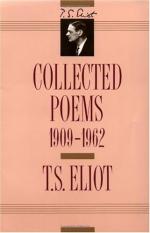|
This section contains 3,503 words (approx. 12 pages at 300 words per page) |

|
When we think of the character of literary dictators in the past, it is easy to see that since 1922, at least, Eliot has occupied a position in the English-speaking world analogous to that occupied by Ben Jonson, Dryden, Pope, Samuel Johnson, Coleridge, and Matthew Arnold. It is noticeable that each of these dictators has been a critic as well as a poet, and we may infer from this the fact that it is necessary for them to practice both poetry and criticism.
Another characteristic is that each of these literary dictators has in some way reversed the judgments of his immediate predecessor. (p. 119)
When we come to Eliot's reign, we find that something has really been added: we have virtually two dictatorships from one literary dictator. Between 1922 and 1933 Eliot, in a series of unprecedented essays which were initially disguised as book reviews, revaluated the history of English poetry...
|
This section contains 3,503 words (approx. 12 pages at 300 words per page) |

|


